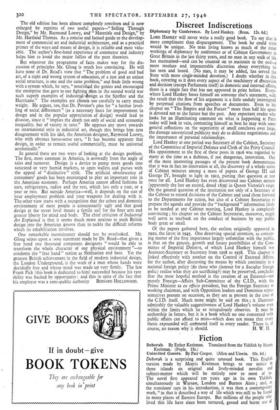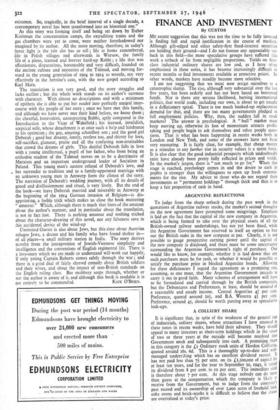Fiction
Deborah. By Esther Kreitman. Translated from the Yiddish by Morris Kreitman. {Foyle. 15s.) Uninvited Guests. By Parr Cooper. (Allen and Unwin. 10s. 6d.) Deborah is a surprising and quite unusual book. This English version made by Morris Kreitman brings to our notice in these islands an original and lively-minded novelist and subject-matter which will be entirely new to most of us. The novel first appeared ten years ago' in its own Yiddish, simultaneously in Warsaw, London and Buenos Aires ; and, as the translator rays in his introduction, it was then a contemporary work, "in that it described a way of life which was still to be found in many places of Eastern Europe. But millions of the people who lived this life have since been tortured, gassed and burnt out of existence. So, tragically, in the brief interval of -a single decade, a contemporary novel has been transformed into an historical one."
As this story was forming itself and being set down by Esther Kreitman the concentration camps, the extradition trains and the gas chambers were yet to come, were neither foreshadowed nor imagined by its author. All the more moving, therefore, in today's fierce light is the tale she has to tell ; life at home remembered, life in Polish villages and afterwards in Warsaw, the family life of a pious, learned and forever hard-up Rabbi; life that was affectionate, disputatious, honourable and very difficult, founded on the ancient culture and mysteries of the Talmud, and moving for- ward in the young generation of 1904 to 1914 to wrestle, not very effectively in the heroine's case, with the new gospel according to Karl Marx.
The translation is not very good, and the story straggles and lacks outline ; but the whole work stands on its author's sureness with character. With almost no descriptions and with a minimum of epithets she is able to put her reader into perfectly nat4ral inter- course with the people of her story ; once we have met this family, and althotigh we have never met their kind before, we know them ; the cheerful, benevolent, unsuspecting Rabbi, aptly compared in the Introduction to the Vicar of Wakefield ; his learned, invalidish, sceptical wife, whose detachment is at once such a help and hindrance to his optimism ; the gay, amusing schoolboy son ; and the good girl Deborah; but dreamy, lonely, restless too, and thirsty for love, self-sacrice, glamour, praise and all the confusing non-attainables that crowd the dreams of girls. This dutiful Deborah falls in love with a ,young intellectual, a pupil of her father, who from being an orthodox student of the Talmud moves on to be a doctrinaire of Marxism and an important underground leader of Socialism in Poland. This yonng man's austere refusal of Deborah's love, and her surrender to tradition and to a family-appointed marriage with an unknown young man in Antwerp form the climax of the story. The narration of Deborah's wedding journey, with all its details of greed and disillusionment and ritual, is very lively. But the end of the book—we leave Deborah married and miserable in Antwerp at the beginning of the 1914 German invasion of Belgium—is dis- appointing, a feeble trick which makes us close the book muttering " amateur." Which, although there is much that hints of the amateur about the author's manner, and in particular about the translation, is not in fact just. There is nothing amateur and nothing tricked about the character-drawing of this novel, nor any falseness save in this accidental device of the wind-up Uninvited Guests is also about Jews, but this time about Austrian refugee Jews, a doctor and his family who have found shelter in— of all places—a small military station in India. The story derives novelty from the juxtaposition of Jewish-Viennese simplicity and intelligence and the conventions of English regimental life. There is a love-story which we are made to understand will work out happily, If only young Captain Roberts comes safely through the war - and there is a good deal of fairly shrewd comedy about British soldiers and their wives, and about the impact of non-British standards on the English ruling class. But snobbery seeps through, whether or not the author is aware of it, and although this book is readable it is



























 Previous page
Previous page